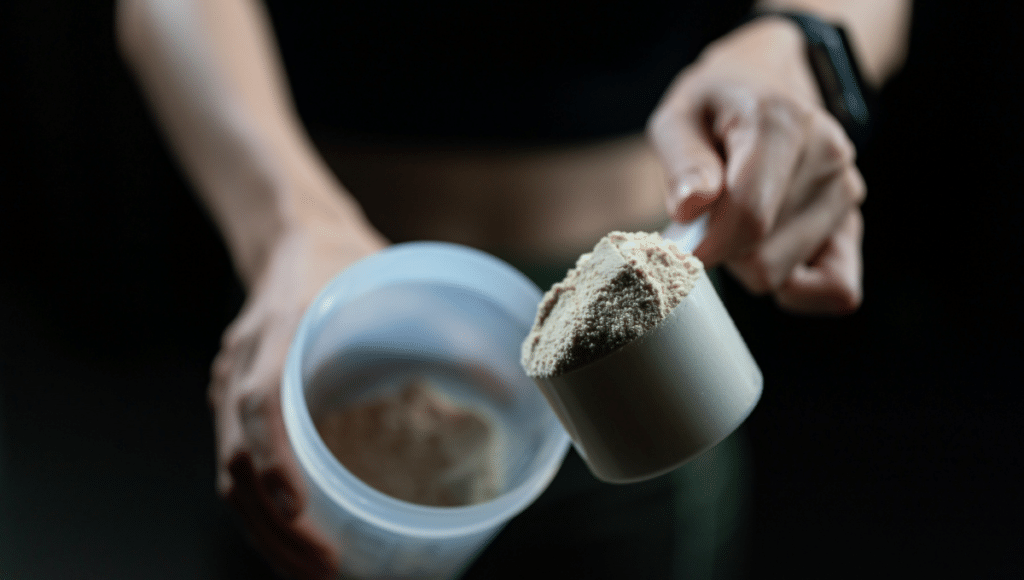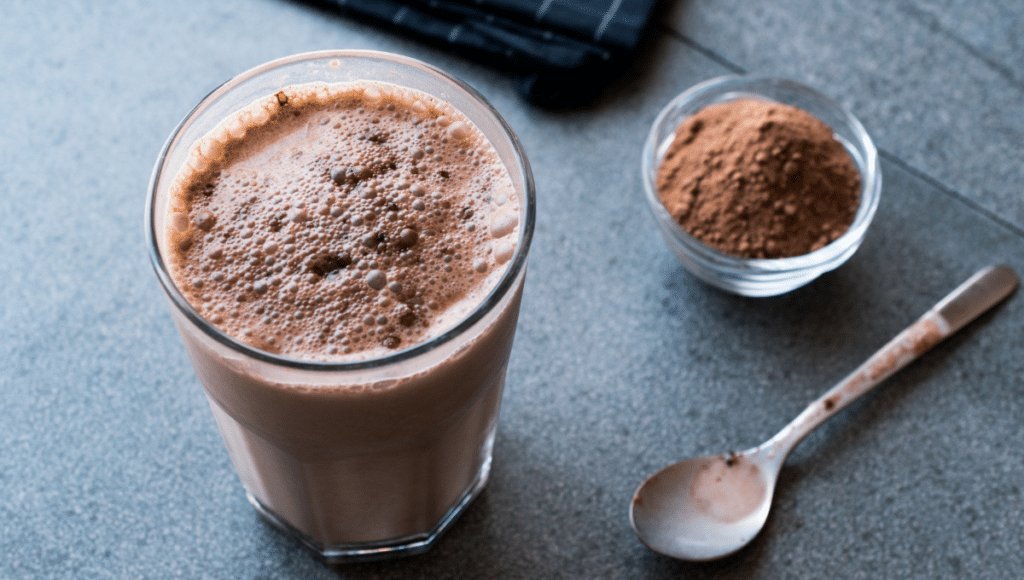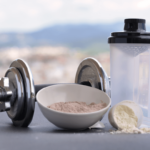Who knew there could be disadvantages to protein shakes?
Lucky for you, we’re going in-depth on whey, what whey is, the benefits and downsides of consuming whey for your workout goals, the types of protein in milk, and where to get natural sources of whey protein all in one place. But let’s start at the beginning…
Jump to:
So, What Is Whey Actually?
To understand whey, you must first understand milk. Milk in a whole is made of two proteins which are casein and whey. Whey protein can be separated from the casein in milk or formed as a by-product of cheese making. If you’ve ever opened a yogurt container and seen liquid floating on top—that’s whey. Cheesemakers used to discard it before they realized its commercial value.
Now there are three types of protein; whey concentrate, whey isolate, and whey hydrolysate.
To go in deeper, whey concentrate is about 70-80% protein, which contains some fat and will produce the best flavor while whey protein isolate is about 90% protein, but contains less fat and similar beneficial nutrients that are found in whey concentrate. And lastly, whey hydrolysate has been pre-digested meaning it will be absorbed by the body faster, which is better for people with digestive issues.
Whey protein is also low in lactose content, is rich in the 9 essential amino acids, and has many other benefits associated with whey which we’ll go into shortly.
The Best Foods To Eat That Have Lots Of Whey Protein
Long story short the best three sources of protein is going to be milk, cheese, and yogurt. This is accurate for cows, goats, and other animals’ milk and cheese.
This means there’s whey in ice cream, cottage cheese, whip cream, sour cream, etc. However non-dairy milks like oat milk, almond milk, and coconut milk do not contain whey protein.
Unexpected Whey In Foods
Now if you’re trying to up your consumption of whey protein and are interested to know where you might see more whey here’s a list of the most unexpected foods that typically contain that protein:
- Baked Goods
- Salad Dressings
- Emulsifiers
- Infant Formula
- Medical Nutritional Formulas

Supplemental Forms of Whey: Should You Use Them?
A study published in the International Journal of Sport Nutrition and Exercise Metabolism concluded that “whey protein supplementation during resistance training offers some benefit compared to resistance training alone.” And that, “males who supplemented with whey protein had a greater relative gain in lean tissue mass.”
This was shown further when they explained that “whey isolate provides significantly greater gains in strength, lean body mass, and a decrease in fat mass compared with supplementation with casein during an intense 10-week resistance-training program.”
Basically, to sum it all up, whey protein supplements are a great aid to increase muscle growth and development. Clean whey protein supplements typically digest pretty quickly and are rich in amino acids that is essential for helping with recovery and muscle growth after endurance and resistance exercise.
In this process, when your body digests amino acids they become available for muscle protein synthesis which aids in the development of new muscle and therefore can increase muscle size.

Can Your Diet Consist Of Only Whey?
Whey protein has a long list of advantages for your health. A diet that consists of only whey protein (or any other food) isn’t healthy at all, so it’s important to go beyond whey and get all the proper nutrients to get the most health benefits and avoid bad effects on blood pressure and hinder your weight loss efforts.
So What Are The Benefits Of Whey?
Results typically depend on the amounts of whey protein consumed and in addition to lowering metabolic disease risk factors like inflammation, high blood pressure, and high blood sugar levels, it has been shown to aid weight maintenance and improve body composition.
But let’s go further into the benefits here:
Decreased Health Issues
Whey is great at lowering metabolic diseases and other health risks while simultaneously helping build muscle mass. See, you might think whey protein can assist in only helping you achieve your workout goals, but in reality, it can really make a difference on the scale and at the doctor’s office.
Fixes Blood Levels
Whey has been proven to lower elevated blood pressure and can have very good effects on blood cholesterol. Taking long-term, high-dose whey protein supplementation before or with a high-carb meal is shown to moderate blood sugar and lower the risk factor of other serious health issues, especially for people with type 2 diabetes.
Lowering The Risk Of Obesity
Using whey protein is a well-known weight-loss strategy, in one study published in 2011 in the Journal of Nutrition, researchers instructed overweight adults to take two whey supplements daily but change nothing else about their diets until the period is over.
After the twenty-three weeks, the whey group had lost more body weight and fat mass and their waist size was smaller than the control group. In another study published in 2010 in Nutrition Journal, obese adults were told to use several whey-based meal replacements per day and lost significantly more weight and body fat over forty weeks than adults that didn’t have the whey supplements.

The Problem With Whey:
In moderation, whey protein does not typically cause any real harm. However, consuming very high doses of protein per day can cause things like stomach pains, cramps, reduced appetite, nausea, and headaches.
Consistent high doses of whey protein may also cause acne on the face and back. Some people believe that there are risks from nutritionally refined foods such as whey protein powder, because, they might contain a lot of nutrients that the body does not need, which can be harmful depending on what nutrient is consumed at higher levels. Especially if you’re continuously taking grams of whey protein powder that is poorly made and filled with lots of extra junk like sugar.
Don’t throw out the powder just yet though, cleaner sources of whey protein can be a good-quality protein source (when used correctly), as there are many benefits of whey protein. According to the National Library of Medicine, these nutrients include lactoferrin, beta-lactoglobulin, alpha-lactalbumin, and immunoglobulins.
Eating too much protein can increase your risk of kidney stones or kidney disease by putting more stress on your kidneys from the abundance of protein so when adding additional protein to your meals, try focusing more on natural foods for your sources of whey protein and watch your consumption of protein in a whole.















